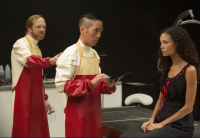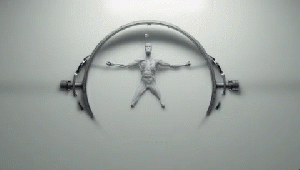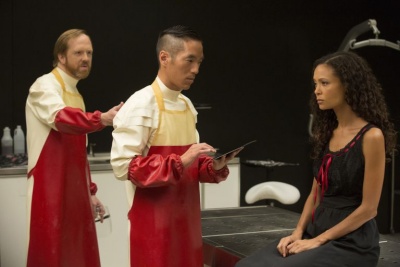Difference between revisions of "Westworld and AI"
(→Main Characteres) |
|||
| Line 30: | Line 30: | ||
The first few episodes threw the audience right into Westworld to show the relationship between programmers and hosts. The viewers were introduced to significant guests of the park and the ethics behind re-booting the hosts every night. The plotline was thick; it took a few episodes to truly understand how hosts would be brought into a new storyline according to specific guest interaction. It’s a lot. Long story short, the theme parks offers its visitors to play in the wild west — the large area of land is filled with hosts, which are androids that are pre-assigned to a narrative and socialize with guests. But although these are robots, they are indistinguishable from any other human. Their memories are wiped every day and the bots are set back in the place every morning. The guests that step into the park are told they can do whatever they want to the robots without any harm, but that’s where the plot thickens. | The first few episodes threw the audience right into Westworld to show the relationship between programmers and hosts. The viewers were introduced to significant guests of the park and the ethics behind re-booting the hosts every night. The plotline was thick; it took a few episodes to truly understand how hosts would be brought into a new storyline according to specific guest interaction. It’s a lot. Long story short, the theme parks offers its visitors to play in the wild west — the large area of land is filled with hosts, which are androids that are pre-assigned to a narrative and socialize with guests. But although these are robots, they are indistinguishable from any other human. Their memories are wiped every day and the bots are set back in the place every morning. The guests that step into the park are told they can do whatever they want to the robots without any harm, but that’s where the plot thickens. | ||
| − | ==Main | + | ==Main Characters== |
===Dolores Abernathy=== | ===Dolores Abernathy=== | ||
Revision as of 03:55, 23 April 2018
|
Westworld[1] is an HBO American science fiction thriller television series created by Jonathan Nolan and Lisa Joy. The setting takes place in fictional Westworld, more or less an amusement park. The park is centered on android hosts in its technologically advanced story. Westworld caters to rich guests who can leave their mortal life behind and dive into the park, with a so-called complete power of the hosts. The TV series is the second series based off of the two films Westworld (1973) and Futureworld (1976). The first of the series was Beyond Westworld (1980). Westworld was ranked as the most-watched first season of an HBO original series ever. With positive reviews for story and visuals, the series will return for a second season on April 22, 2018. The series had more viewers than any other show at the time. It averaged 11.7 million viewers throughout its run.
The Creation
Writer's Idea
The development of Westworld actually stemmed from a remake of a 1990's film. Jonathan Nolan undertook the project, as he saw an opportunity to revamp this storyline. The film was transformed into an HBO series and along came a huge following into the maze of artificial intelligence. When dealing with the first draft of the series, Nolan explains where his goal was headed. In a tech conference panel[2] of Westworld creators and actors, he stated that 'the idea you find something in human nature that was beautiful was essential to the project from the beginning, or that our flaws might turn out to be the things that save us.'
Pilot Season
‘A dark odyssey about the dawn of artificial consciousness and the future of sin.’ - Series Synopsis
The first few episodes threw the audience right into Westworld to show the relationship between programmers and hosts. The viewers were introduced to significant guests of the park and the ethics behind re-booting the hosts every night. The plotline was thick; it took a few episodes to truly understand how hosts would be brought into a new storyline according to specific guest interaction. It’s a lot. Long story short, the theme parks offers its visitors to play in the wild west — the large area of land is filled with hosts, which are androids that are pre-assigned to a narrative and socialize with guests. But although these are robots, they are indistinguishable from any other human. Their memories are wiped every day and the bots are set back in the place every morning. The guests that step into the park are told they can do whatever they want to the robots without any harm, but that’s where the plot thickens.
Main Characters
Dolores Abernathy
Dolores Abernathy, played by Evan Rachel Wood, is the oldest host in the park who sees beauty in the world. She is the main character who shows progression and tells the story of evolving into consciousness. Her saying, ‘some people choose to see the ugliness in this world, where I see the beauty,’ plays a bigger role in her narrative. She begins to remember previous narratives as she breaks free from her programming.
Teddy Flood
Teddy, played by James Marsden, plays the role of a mysterious host who wants a simple life, in particular contrast to Dolores. This character was programmed with a troubled past and is willing to go to significant extremes for Dolores.
Maeve Millay
Maeve, played by Thandie Newton, is a seductive, yet tough character. She is a significant part of this show because she’s starting to realize the nature of her world. She becomes conscious host to understand that every character is on a loop, and learns how to wake up after being shut down. After seeing her thoughts in the form of code and immediately starts to plan her attack and get her freedom.
Dr. Robert Ford
Robert Ford, played by Anthony Hopkins, is the Park Director of Westworld which reflects his 30-year-old vision for the future. it’s very unclear what Ford’s end game is to both employees and characters int he park. He is a sharp character who bears all control over Westworld. His feelings towards the host progressively becomes ambiguous, transpiring from enjoying their company to treating them as objects. He has watched humanity at its worst and their cruelty towards the host, when the park, in his mind, was meant for much more.
Bernard Lowe
Bernard, played by Jeffrey Wright, is the Head of Behavior in the park who uses his skills to address host issues. Bernard is introduced as an awkward character who seems to have trouble communicating with others in a non-professional setting. Viewers eventually find out that Bernard is actually a host who was built in the image of one of the co-founders of the park. He was programmed to believe he was a human being and learns this about himself in the first season.
The Man In Black
The 'Man In Black' or William, played by Ed Harris, is a human guest who has been coming to the park for 30 years. His character is interesting because he is on a mission to discover the meaning of Westworld’s entire narrative. While searching for a deeper level into the park, and a board member, he becomes a new insight into the meaning of Westworld.
Major Episodes
Peter Abernathy's Opening
This character's host is the father of the main character Dolores Abernathy (also host). He lives on a ranch outside of town and his main goals are to take care of his daughter and look after his cattle. During the opening episode of the season, Peter finds a photograph that had fallen from the pocket of a guest -- he stays up day and night contemplating where the photograph was taken and who it belongs to. When asking Dolores what she thinks about the woman in the picture, she answers 'I don't see anything.' This is the first moment in the series where we see a host breaking out of his programming.
The fear in Peter's eyes as he realizes that his whole life might be a lie is truly horrifying. We watch as this host transforms from a seemingly caring father figure to an android full of fear and malfunction. He threatens destruction against his creators and warns Dolores to leave the park as fast as she can. This was only the beginning of hosts moving towards self-awareness.
Maeve's Moments
Through captivating characters, the viewers observe that Westworld’s hosts are beginning to discover their identities. As each episode progressed, each host began to retain more information on their background. Main characters that viewers assumed were human beings turn out to be androids, boundaries are tested by bold hosts who wish to turn the tables, and the guests are in for a brutal surprise.
The character Maeve Millay, portrayed by Thandie Newton, plays a central role in the storyline. Her increased self-awareness and memory begins to cause problems for Westworld staff. Millay, a brothel madame in Westworld eventually manipulates her human programmers and maintenance technicians and is allowed to explore levels of the park typically reserved only for those in control, resulting in her realization that she is, in fact, not human, and was created for the entertainment of Westworld patrons. Maeve's emotive response while witnessing the violent disassembly of another artificially intelligent android present a conflict between the HBO show audience's awareness that the characters are not human and the human-like behavior that they present, paralleling popular debate over the definition of sentience - "the capacity for phenomenal experience or qualia, such as the capacity tofeel pain and suffer" and sapience - "a set of capacities associated with higher intelligence, such as self- awareness and being a reason-responsive agent" which, to some, represent qualities that qualify a being as a moral entity requiring full moral status equivalent to human beings and preclude them from acts to which humans would legally not be subject.[3]
The Takeover
The season’s finale ended with hosts shooting at guests and deciding to do it their way. But spoiler alert, the programming had taken control of the wheel and warped the narrative. We are taken back to Maeve, finding out that her desire to leave the park and free herself from Westworld was always programmed in her code. This brings the entire storyline back to the idea of how far self-awareness can truly go and the level of consciousness.
Dilemma of AI
Westworld vs. Reality
Westworld is a fictional depiction of humanoid robots that are indistinguishable from real humans and the implications that are caused when the begin to question their reality and think on their own. Many viewers consider the plotline as a template for the potential dangers of AI, and how it serves as a cautionary tale for the dangers of AI. In the first season, the series displays humanoid characters that realize they are living in a simulated universe for the humans' enjoyment. They react to this realization by attempting to escape into the real world through killing humans that are keeping them there. Artificial intelligent technology is currently at a level in which the systems can make intelligent decisions and predict outcomes. Autonomous vehicle technology is becoming more advanced, and machine learning algorithms can learn from widely accessible data. Viewers of the TV series have expressed concern about artificial intelligence due to the implications that arise in the show. Westworld reflects the Android’s need for freedom and shows how artificial general intelligence can learn, complete tasks and develop a form of human consciousness. Artificial intelligence will continue to increase in our world, and while the technology that is displayed this show is not currently available recent technological advancements show that higher levels of AI systems are being researched and are in development.
The Future of Robots
In an interview[4] last year, Stephen Hawking explained his concerns about artificial intelligence and how he believed that they may eventually replace human beings. He stated ‘The real risk with AI isn’t malice, but competence. A super-intelligent AI will be extremely good at accomplishing its goals, and if those goals aren’t aligned with ours, we’re in trouble.’ He spoke about the need for control, and about a plan to identify threats in machinery. Whether or not these machines are conscious, they will be able to think. We are on a path of extreme advancement in technology, and machine learning is only the beginning.
References
- ↑ Westworld. (2018). HBO. Retrieved 1 April 2018, from https://www.hbo.com/westworld
- ↑ “Inside the Minds of Westworld Co-Creators Jonathan Nolan, Lisa Joy.” Geek.com, 9 June 2017, www.geek.com/television/inside-the-minds-of-westworld-co-creators-jonathan-nolan-lisa-joy-1702628/.
- ↑ Bostrom, Nick, and Eliezer Yudkowsky. “The Ethics of Artificial Intelligence.” The Cambridge Handbook of Artificial Intelligence, pp. 316–334., doi:10.1017/cbo9781139046855.020. https://intelligence.org/files/EthicsofAI.pdf
- ↑ Sulleyman, Aatif. “Stephen Hawking Warns Artificial Intelligence 'May Replace Humans Altogether'.” The Independent, Independent Digital News and Media, 2 Nov. 2017, www.independent.co.uk/life-style/gadgets-and-tech/news/stephen-hawking-artificial-intelligence-fears-ai-will-replace-humans-virus-life-a8034341.html


